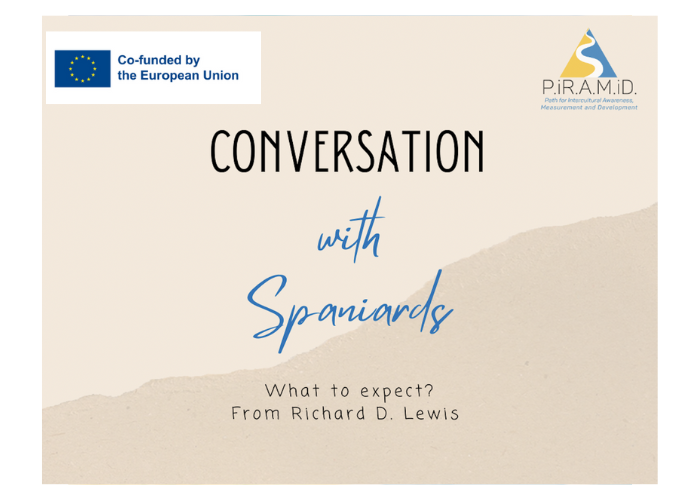This website use cookies to ensure you get the best experience on our website

P.IR.A.M.iD
2023-1-ES01-KA220-VET-000157060
Conducting Conversations with Spaniards: What to Expect from Richard D. Lewis's Perspective
15 April 2024

Spain is not a homogenous entity but a mosaic of diverse cultures, each with its own traditions, languages, and customs. From the fiery flamenco of Andalusia to the rugged landscapes of Galicia, Spain's regions offer a kaleidoscope of cultural experiences. Understanding and respecting these regional differences is crucial for effective communication and mutual respect.
Conversations with Spaniards are often lively, engaging, and full of warmth. Understanding the cultural nuances and communication patterns can help navigate interactions effectively and build meaningful connections. Here's what to expect when engaging in conversations with Spaniards referring to the book of «When Cultures Collide» by Richard D. Lewis.
Spaniards are known for their passionate and expressive communication style. Conversations may involve animated gestures, vivid storytelling, and a wide range of emotions.
Small Talk is an essential part of building rapport and establishing connections. Spaniards prioritize personal relationships, even in professional settings. Expect conversations to start with a small talk, as Spaniards value getting to know their colleagues on a personal level. They respect professionalism, they also enjoy a relaxed and informal atmosphere. There is a balance between formal and informal communication styles, depending on the context and the individuals involved.
It is common to take pride in the rich history and cultural heritage of Spain, which often influences their approach to education. Conversations may involve references to historical events, literature, or art, reflecting a deep appreciation for tradition and heritage.
People from Spain are more likely to participate in lively discussions and debates, welcoming diverse viewpoints and opinions. Encourage active participation and create an inclusive environment where everyone feels heard and respected. However, they often stray from the main topic to share personal stories or explore related ideas. Embrace these tangents as chances to learn more about their perspectives and experiences, deepening your connection with them.
Spaniards value physical closeness and may engage in friendly gestures such as handshakes, hugs, or cheek kisses when greeting or saying goodbye. Respect personal space and boundaries, but don't be surprised if conversations feel more intimate and tactile compared to other cultures.
Spaniards appreciate flexibility and adaptability in educational settings. Be open to changes in plans or schedules, as unexpected events or last-minute adjustments are not uncommon.
Expect to be greeted warmly and offered food, drinks, or hospitality during conversations. Express gratitude and reciprocate the kindness to foster a positive and harmonious exchange.
Remember, there are several Spains (Castile, Andalusia, Galicia, Catalonia, the Basques). Make sure you know where people’s allegiances lie.
In summary, having a conversation with a Spaniard is a lively experience characterized by warmth, passion, and a deep ties to heritage. Meaningful encounters can be established by adopting their dynamic communication style, respect for history, and value for personal ties. Effective communication requires an awareness of the various regional cultures found throughout Spain as well as an appreciation of personal distinctions. Engaging with Spanish speakers can result in meaningful conversations and enduring relationships if done so with adaptability, openness, and thankfulness.
References: Richard D. Lewis's Pyramid Model of Cultural Differences

This project has been funded with support from the European Commission.
This publication reflects the views only of the authors, and the Commission cannot be held responsible for any use which may be made of the information contained therein.
